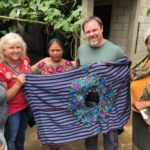October is domestic violence awareness month. One in four women will suffer domestic violence in their lifetime according to the National Coalition Against Domestic Violence (NCADV). While domestic violence happens in every community and affects all people regardless of race, age, gender, religion, or socio-economic status, I was an unlikely victim.
Raised on an Illinois farm, the first in my family to receive a college degree, I attended the Haas School of Business and later became a successful banker living in an affluent California community. My life took a tragic turn when multiple life changing events occurred in tandem. I became disabled and shortly thereafter verbal and emotional abuse in my home escalated. The next year it culminated in an incident. No one knew of the situation except a few neighbors who had been witnesses. Silence is all too common among domestic violence victims.
I had no access to my only resources and therefore no attorney. Years later I would end up paying my children’s father’s attorneys’ fees despite my inability to retain an attorney. Payment of his fees came from the resources I had struggled to rebuild after the separation. I twice lost my home, the first time creating an inconceivable situation of being forced to move almost 2000 miles away from my children. I had my personal bank accounts frozen without hearing and my children’s father was given my Social Security derivative benefit despite the disparity in income.
The reality is, few safeguards exist to prevent these abuses and the continued watering down of the Violence Against Women Act (VAWA) and the methodical eroding of federal avenues Congress has provided to move state court cases to the federal court, is a troubling trend. As federal safeguards diminish, our communities are increasingly feeling the impact by an escalating homeless population of women and children.
Once a victim leaves, financial and emotional abuse are commonplace and is often escalated by the adversarial nature of our courts. Failure to recognize the greater implications to our communities will serve to further isolate many women and children. We not only need to work alongside secular advocates, but we have a unique opportunity to provide spiritual support and scriptural interpretation that supports a victim and fosters a “complete” healing including that of the spirit.
While it is easy to recognize the physical scars of domestic violence, emotional and financial abuse are rarely acknowledged. Instead, the parent who has been abused often loses their livelihood, housing and the children they sought to protect. Recent national policies, including the recent changes to DACA, have only increased tragic outcomes in domestic violence cases. An increasing number of women remain in the shadows due to fear of deportation and loss of their children. The secular community has been sounding alarms most recently in California. The “Stanford” case, which gained national attention, brought the disparity of justice in domestic violence cases to the forefront. This culminated in organizations calling on the legislature to audit the council that was tasked with protecting the public from these biases as they were failing more and more domestic violence victims, parents who were speaking out to protect their children.
As I traveled to the CCDA conference in Detroit, I was battle weary. The conference was a needed reminder however of how much CCDA means to me and the collaborative spirit it fosters that nurtures the needed resilience in the work we all do. Resilience is God speaking into our hearts to not stop. It is about bouncing back.
God has humbled me in this journey. I have a unique perspective of experiencing places where inexplicable injustices exist. I also know that resilience is necessary to continue to speak alongside those who are suffering. If a white woman from a gated community can lose the right to speak, the right to her home, the right to liberty without interference, the right to protect personal information, what chance do those already marginalized have in receiving justice if we don’t stand alongside them?
As I look back at the long road I have traversed, through the state and federal courts, in an effort to bring awareness to an alarming issue, I see those experiences as a testimony to God’s great power. To continue the journey more effectively together, we need strong intercessory prayer, and as there is opportunity, to challenge the status quo, working toward change and to bring visibility to this often “invisible” crime, empowering those impacted by its harm.
To learn more see a couple resources below:
National Coalition Against Domestic Violence (NCADV) – https://ncadv.org/
California Partnership to End Domestic Violence – http://www.cpedv.org/
Marci Patera is the founder of Emmy’s Place, a ministry being launched to provide spiritual support and practical services to battered women and children.
Marci earned her Bachelor’s degree in Business Administration in finance and legal studies from U.C. Berkeley’s Haas School of Business. She has been active on issues surrounding civil right to counsel. Marci is trained in Safe Families, Children’s Grief Support, and Stephen’s Ministries advocating for stronger state and federal protections for domestic violence victims and recognition and prevention of financial abuse. Marci is currently petitioning to close a loophole in the California Family Code that allows judicial discretion to remove disability benefits for the support of minor children from disabled parents.
Marci has three children, 24, 21, and 14, who have been the inspiration for Emmy’s Place.




